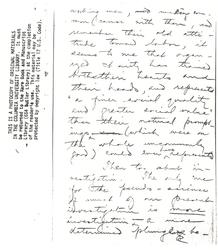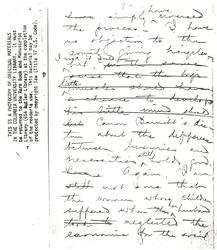My dear Miss Addams,
This letter is an affliction that you have brought upon yourself, for you asked me to write it. I read your book from cover to cover last Sunday and wish all my fellow-countrymen could and would do the same. It is not just a book but a very loveable and wise human being reasoning with us and striving to help us to a more reasoned human point of view. But my feeling about the whole book is not what you want probably but my [opinion] [page 2]. You really wanted ↑in the goodness of your heart,↓ to give me a chance to relieve my mind about Chapter II. and When I have done this you may think ↑truly↓ I am trying to treat you as Prof. Patten treats Herbert Spencer. when He says of him that Spencer is a man we all delight to quote about any specialty except our own. But the fact is that the chapter ↑is the one of all others that I shall take pleasure in quoting and giving↓ as a whole is just what I should like to ↑& half take pleasure in↓ giving to my own workers, though I should ↑shall↓ point out ↑to them↓ three or four things that seem to me to need [restatement]. [page 3]
In the first place, anything that discourages people from acting together in charity seems to me is a harmful thing ↑to say↓ just at present. We ↑In charity, the↓ individual still "has the best of it" and all that. You say on page 138 about ↑the shortcomings of other↓ other associated effort ↑undoubtedly↓ applies ↑with great force↓ to our own. Now to say that the juxtaposition of the words "organized" and "charity" is distasteful to you, is to discourage ↑and delay improvements in our associated charitable effort Hundreds of other people might say it without [affecting our cause?]↓ To say that we are trying to substitute a theory of social conduct for the natural promptings of the [page 4] heart is ↑also↓ most distinctly discouraging especially when you are [illegible] be so heartily ↑make it very clear in the same book that you are↓ opposed to leaving the industrial situation to any such uncertain arbiter. Leaving things to the natural promptings of the human heart never passed a child labor law, a factory inspection law, or a good school bill, but organized charity and organized labor combined did all three in Maryland the other day. When I think of the individuals who worked hard with shoulder to shoulder with the [page 5] working men, and making common cause with them, and remember their old attitude toward labor, it seems to me that organized charity has trained both their hearts and their heads, and represents "a finer social quality and greater social value" than their natural promptings, ever (which were on the whole uncommonly good) could ever ↑have↓ represented.
Then too about investigation. The only cure for the pseudo-science of much of our present investigation is more investigation -- a more determined plunge beneath [page 6] the surface classifications of "worthy" and "unworthy" and all other stupid labels; [and] a willingness to spend our finest ↑costliest↓ material, our best brains, and time and strength upon this crucial ↑delicate↓ task of finding out the best ↑right↓ thing to do. We always expect ↑a↓ fine discrimination from you, but nothing that you say in this chapter would indicate that you ↑recognized↓ knew the difference between the good work and ↑the bad work now being done by the charitable societies in my department↓. Indeed, it is not true that good ↑the best↓ investigations ↑now made↓ have the effect you say. Made upon a ↑One wonders who↓ [page 7] the tyros are who either demand or accept the temperance, ↑the↓ cleanliness, ↑the↓ thrift and ↑or the↓ church observance standard to which you refer. No one has worked a year with any charity organization society worthy the name without learning to brush these things quietly aside and get down to life's realities. They That such absurd methods and results are necessarily a part of organized charity, not our words but our deeds must deny.
These are the only two things about [page 8] which I feel inclined to break a lance with you. It is true that ↑Organized charity is a painfully imperfect thing, but it↓ is a great advance on the disorganization which it replaces, and good investigation is not a thing to deplore ↑at all,↓ but a thing to spend ourselves lavishly upon until we make it better and best. It is true that you leave the impression that we think only the "worthy poor" ought to be helped, but I let that pass. Your family that got beans from the county and bought the bicycle should [page 9] have simply ↑have↓ reversed the process. I have no objection to the county giving bicycles, ↑I wish it would↓ but, in the same sense that the boy's ↑little↓ muscles should have a chance to develop his little mind should but Canon Barnett's dictum about the difference between luxuries and necessities ↑still↓ holds good here. Again, I am still not sure that the woman whose children suffered when the ↑her↓ husband took to neglected the economic for the social [page 10] virtues, belongs in the same class with the other women you mention. She looms ↑Her sacrifice differed↓ was so much greater not only in degree but in kind, that, ↑and↓ the larger she looms, the more the husband shrivels. But in these individual instances you have the advantage of your readers, for you know the people ↑and to us, who do not↓ and the whole story never can be told.
This is absolutely all I have to say. [page 11] You have brought ↑out↓ the difference, industrially, between the ↑Catholic↓ sister and the tenement dweller more clearly than in your Atlantic article, and ↑[It]↓ you always seemed to me that no one was surer of economic security than a Catholic sister, and in view of this fact, and you have cut out the passage about Octavia Hill and Lord Shaftesbury. I'm a little sorry that you left out the paragraph ↑near the end↓ about "avoiding the perplexity [page 12] and losing the vitality." There are perplexities enough [be?] about our own worth, ↑heaven knows, [and imperfections all too many]↓ but it seems to me that there is vitality too, and I care so very much for your opinion that I ↑really↓ long, in this Philadelphia wilderness ↑writing as I do from the Desert of Sahara to a charity organization,↓ that you should recognize it a little our undeveloped possibilities. No doubt you do, but in your own broadly tolerant way, but one chapter could not ↑be expected to say↓ or say everything.














































Comments